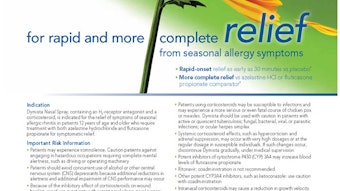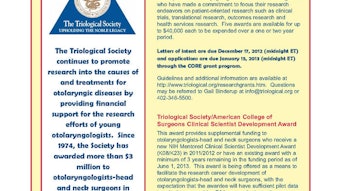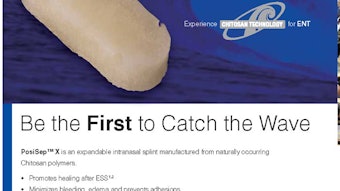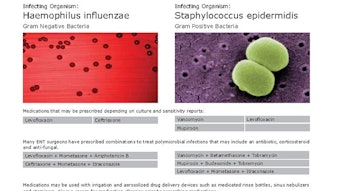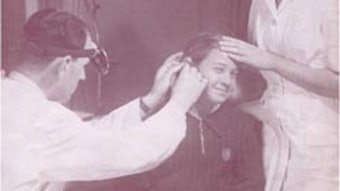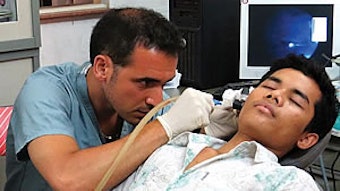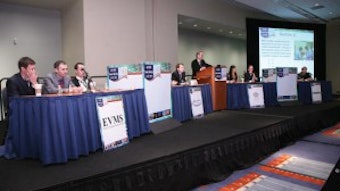How to Avoid CMS Quality Initiative Payment Penalties
Next year is a pivotal year in the development of numerous quality initiatives currently underway by the Centers for Medicare and Medicaid Services (CMS). These include the Electronic Prescribing (eRx) Incentive Program, Medicare and Medicaid’s Electronic Health Records (EHR) Incentive Program, and the Physician Quality Reporting System (PQRS). This article is designed to serve as a primer for each of these programs and provide you with the information you need to take advantage of available incentives and avoid payment penalties by becoming compliant. Information on all of these programs can be found on the Academy’s new webpage at www.entnet.org/cmspenalties. Starting next year, CMS will be collecting reporting data from physicians for each of these programs that will be used to calculate payment penalties, which could add up to nearly five percent in payment reductions for non-participating physicians in 2015 (see Table 1). It is essential that members take the necessary steps and begin participating in these programs as soon as possible. Incentive payments are available for physicians who begin participating in PQRS and EHR Meaningful Use to help offset the cost of implementing these systems in practice. Electronic Prescribing (eRx) Incentive Program The eRx Incentive program is designed to facilitate the transition to electronic prescribing software through incentive payments and penalties. E-prescribing can be achieved through stand alone software or through Electronic Health Records that have an e-prescribing capability. 2012 was the first year of the program with both incentive payments and payment adjustments (penalties). 2013 is the last year incentive payments are available for successful e-prescribers. Those who successfully report in 2013 are eligible for a .5 percent bonus for all of their reimbursed Medicare Part B claims. In 2013, physicians must report the eRx measure for at least 25 unique electronic prescribing events in which the measure is reportable by the eligible professional during 2012 in order to be eligible for the .5 percent incentive payment. If a physician fails to report at least 25 prescribing events, or to report the G8553 code via claims for at least 10 unique denominator-eligible eRx events for services provided January 1, 2013, through June 30, 2013, they will be subject to a two percent payment penalty for all Medicare payments in 2014. Physicians who successfully reported in 2011 are exempt from 2013 payment penalties. It is important to note that each year physicians do not meet the criteria for successful electronic prescribing, payment penalties increase. For example, in 2013, physicians will be subject to a 1.5 percent penalty, based on 2012 reporting and in 2014 this increases to a two percent payment penalty, based on 2013 reporting. For more information on the eRx Incentive Program, see the Academy’s information page at http://www.entnet.org/Practice/MedicareERxFactSheet.cfm. Medicare and Medicaid’s Electronic Health Records (EHR) Incentive Program The Electronic Health Records Incentive Program is an initiative from CMS designed to facilitate the use of EHRs in clinical settings. Eligible professionals (EPs), hospitals, and critical access hospitals (CAHs) that demonstrate meaningful use of EHRs are eligible for incentive payments. For EPs, incentive payments can accumulate to up to $44,000 by 2015 if they began to successfully participate in 2012. It is important to note that physicians cannot participate in the eRx Incentive Program and the EHR Medicare Incentive Program simultaneously. The EHR Incentive Program is structured in three stages, with a possible fourth stage starting as early as 2018. In order to successfully demonstrate meaningful use in Stage 1, which began in 2011, EPs must meet 20 objectives out of 25 possible. There are 15 required core objectives while the remaining five objectives may be chosen from the list of 10 menu set objectives. EPs must also report on six total clinical quality measures (CQMs): three required core measures (substituting alternate core measures where necessary) and three additional measures (selected from a set of 38 clinical quality measures). The criteria for meaningful use for Stage 2, which is scheduled to begin in 2014, increases as physicians are required to report higher thresholds and more CQMs. In Stage 2, eligible professionals will have to report all 17 core objectives, which include several consolidated core and menu objectives from Stage 1, and three of six menu objectives. EPs will have two options for reporting CQMs in Stage 2 including reporting nine out of 64 measure choices or successfully reporting Physician Quality Reporting System (PQRS) CQMs through the PQRS EHR reporting option. Just as in the eRx program, there are future penalties for professionals who do not begin participating in the EHR Incentive Program. Beginning in 2015, EPs, hospitals, and CAHs that do not successfully demonstrate meaningful use of EHRs will be subject to a one percent penalty that increases annually up to five percent by 2020. It is important to note that these penalties will be based on reporting submitted two years prior, meaning 2015 payments will be based on 2013 reporting. For more information on the EHR Incentive Program including information on Stage 1 and Stage 2 criteria, see the Academy’s information page at http://www.entnet.org/Practice/ONC.cfm. Physician Quality Reporting System (PQRS) The Physician Quality Reporting System is currently a voluntary reporting program that provides an incentive payment to physicians or groups that report data on quality measures. In 2013, physicians who successfully report data on quality measures are eligible for .5 percent bonus payment on all Medicare claims. Individual eligible professionals may choose to report information on individual physician quality reporting quality measures, or measures groups, to CMS on their Medicare Part B claims, to a qualified Physician Quality Reporting registry, or to CMS via a qualified EHR product, or to a qualified Physician Quality Reporting data submission vendor. Participating physicians are eligible for an additional .5 percent bonus payment for working with a Maintenance of Certification entity and successfully reporting data, participating in, and completing a certified Maintenance of Certification Program practice assessment. The Academy currently offers an online tool called the PQRIwizard to help members collect and report quality measure data for the PQRS program in 2013. The PQRIwizard offers automatic data validation, minimized data entry time, and retrospective or prospective data submission. Information for the PQRIwizard can be found at http://www.entnet.org/Practice/PQRS.cfm. Beginning in 2015, CMS will adopt a payment penalty as part of the PQRS program similar to the eRx and EHR programs. Eligible professionals who do not satisfactorily submit PQRS quality measure data will incur a 1.5 percent payment penalty. This penalty rises to two percent in 2016. To avoid the 2015 payment penalty, an eligible professional must satisfactorily report PQRS quality measure data during the 2013 reporting period (January 1, 2013-December 31, 2013). For more information on PQRS, see the Academy’s information page at: http://www.entnet.org/Practice/cmsPQRIBonus.cfm. There are several reasons for physicians to begin to adopt the technology and initiatives detailed above. There are incentives currently in place for practices and groups like yours to make the transition and adopt new technologies. Physicians are able to participate in several of these programs at the same time, and when combined with other initiatives’ bonuses, there is the potential for increased revenue for practices. Along with these incentives, however, there are potential pitfalls along the way. The Academy encourages members to do their due diligence when investigating which programs and systems are right for their practice. Most importantly however, physicians and groups will begin to see financial penalties for failure to adopt new technologies and initiatives, which could potentially cost their practices up to a 10 percent reduction of all Medicare payments. For any questions or information about these programs, please contact the Health Policy unit at healthpolicy@entnet.org, or visit the Academy’s CMS Quality Initiative webpage at www.entnet.org/cmspenalties.
Next year is a pivotal year in the development of numerous quality initiatives currently underway by the Centers for Medicare and Medicaid Services (CMS). These include the Electronic Prescribing (eRx) Incentive Program, Medicare and Medicaid’s Electronic Health Records (EHR) Incentive Program, and the Physician Quality Reporting System (PQRS). This article is designed to serve as a primer for each of these programs and provide you with the information you need to take advantage of available incentives and avoid payment penalties by becoming compliant. Information on all of these programs can be found on the Academy’s new webpage at www.entnet.org/cmspenalties.
Starting next year, CMS will be collecting reporting data from physicians for each of these programs that will be used to calculate payment penalties, which could add up to nearly five percent in payment reductions for non-participating physicians in 2015 (see Table 1). It is essential that members take the necessary steps and begin participating in these programs as soon as possible. Incentive payments are available for physicians who begin participating in PQRS and EHR Meaningful Use to help offset the cost of implementing these systems in practice.

Electronic Prescribing (eRx) Incentive Program
The eRx Incentive program is designed to facilitate the transition to electronic prescribing software through incentive payments and penalties. E-prescribing can be achieved through stand alone software or through Electronic Health Records that have an e-prescribing capability. 2012 was the first year of the program with both incentive payments and payment adjustments (penalties). 2013 is the last year incentive payments are available for successful e-prescribers. Those who successfully report in 2013 are eligible for a .5 percent bonus for all of their reimbursed Medicare Part B claims.
In 2013, physicians must report the eRx measure for at least 25 unique electronic prescribing events in which the measure is reportable by the eligible professional during 2012 in order to be eligible for the .5 percent incentive payment. If a physician fails to report at least 25 prescribing events, or to report the G8553 code via claims for at least 10 unique denominator-eligible eRx events for services provided January 1, 2013, through June 30, 2013, they will be subject to a two percent payment penalty for all Medicare payments in 2014. Physicians who successfully reported in 2011 are exempt from 2013 payment penalties.
It is important to note that each year physicians do not meet the criteria for successful electronic prescribing, payment penalties increase. For example, in 2013, physicians will be subject to a 1.5 percent penalty, based on 2012 reporting and in 2014 this increases to a two percent payment penalty, based on 2013 reporting.
For more information on the eRx Incentive Program, see the Academy’s information page at http://www.entnet.org/Practice/MedicareERxFactSheet.cfm.
Medicare and Medicaid’s Electronic Health Records (EHR) Incentive Program
The Electronic Health Records Incentive Program is an initiative from CMS designed to facilitate the use of EHRs in clinical settings. Eligible professionals (EPs), hospitals, and critical access hospitals (CAHs) that demonstrate meaningful use of EHRs are eligible for incentive payments. For EPs, incentive payments can accumulate to up to $44,000 by 2015 if they began to successfully participate in 2012. It is important to note that physicians cannot participate in the eRx Incentive Program and the EHR Medicare Incentive Program simultaneously.
The EHR Incentive Program is structured in three stages, with a possible fourth stage starting as early as 2018. In order to successfully demonstrate meaningful use in Stage 1, which began in 2011, EPs must meet 20 objectives out of 25 possible. There are 15 required core objectives while the remaining five objectives may be chosen from the list of 10 menu set objectives. EPs must also report on six total clinical quality measures (CQMs): three required core measures (substituting alternate core measures where necessary) and three additional measures (selected from a set of 38 clinical quality measures).
The criteria for meaningful use for Stage 2, which is scheduled to begin in 2014, increases as physicians are required to report higher thresholds and more CQMs. In Stage 2, eligible professionals will have to report all 17 core objectives, which include several consolidated core and menu objectives from Stage 1, and three of six menu objectives. EPs will have two options for reporting CQMs in Stage 2 including reporting nine out of 64 measure choices or successfully reporting Physician Quality Reporting System (PQRS) CQMs through the PQRS EHR reporting option.
Just as in the eRx program, there are future penalties for professionals who do not begin participating in the EHR Incentive Program. Beginning in 2015, EPs, hospitals, and CAHs that do not successfully demonstrate meaningful use of EHRs will be subject to a one percent penalty that increases annually up to five percent by 2020. It is important to note that these penalties will be based on reporting submitted two years prior, meaning 2015 payments will be based on 2013 reporting.
For more information on the EHR Incentive Program including information on Stage 1 and Stage 2 criteria, see the Academy’s information page at http://www.entnet.org/Practice/ONC.cfm.
Physician Quality Reporting System (PQRS)
The Physician Quality Reporting System is currently a voluntary reporting program that provides an incentive payment to physicians or groups that report data on quality measures. In 2013, physicians who successfully report data on quality measures are eligible for .5 percent bonus payment on all Medicare claims. Individual eligible professionals may choose to report information on individual physician quality reporting quality measures, or measures groups, to CMS on their Medicare Part B claims, to a qualified Physician Quality Reporting registry, or to CMS via a qualified EHR product, or to a qualified Physician Quality Reporting data submission vendor. Participating physicians are eligible for an additional .5 percent bonus payment for working with a Maintenance of Certification entity and successfully reporting data, participating in, and completing a certified Maintenance of Certification Program practice assessment.
The Academy currently offers an online tool called the PQRIwizard to help members collect and report quality measure data for the PQRS program in 2013. The PQRIwizard offers automatic data validation, minimized data entry time, and retrospective or prospective data submission. Information for the PQRIwizard can be found at http://www.entnet.org/Practice/PQRS.cfm.
Beginning in 2015, CMS will adopt a payment penalty as part of the PQRS program similar to the eRx and EHR programs. Eligible professionals who do not satisfactorily submit PQRS quality measure data will incur a 1.5 percent payment penalty. This penalty rises to two percent in 2016. To avoid the 2015 payment penalty, an eligible professional must satisfactorily report PQRS quality measure data during the 2013 reporting period (January 1, 2013-December 31, 2013).
For more information on PQRS, see the Academy’s information page at: http://www.entnet.org/Practice/cmsPQRIBonus.cfm.
There are several reasons for physicians to begin to adopt the technology and initiatives detailed above. There are incentives currently in place for practices and groups like yours to make the transition and adopt new technologies. Physicians are able to participate in several of these programs at the same time, and when combined with other initiatives’ bonuses, there is the potential for increased revenue for practices. Along with these incentives, however, there are potential pitfalls along the way. The Academy encourages members to do their due diligence when investigating which programs and systems are right for their practice. Most importantly however, physicians and groups will begin to see financial penalties for failure to adopt new technologies and initiatives, which could potentially cost their practices up to a 10 percent reduction of all Medicare payments.
For any questions or information about these programs, please contact the Health Policy unit at healthpolicy@entnet.org, or visit the Academy’s CMS Quality Initiative webpage at www.entnet.org/cmspenalties.

